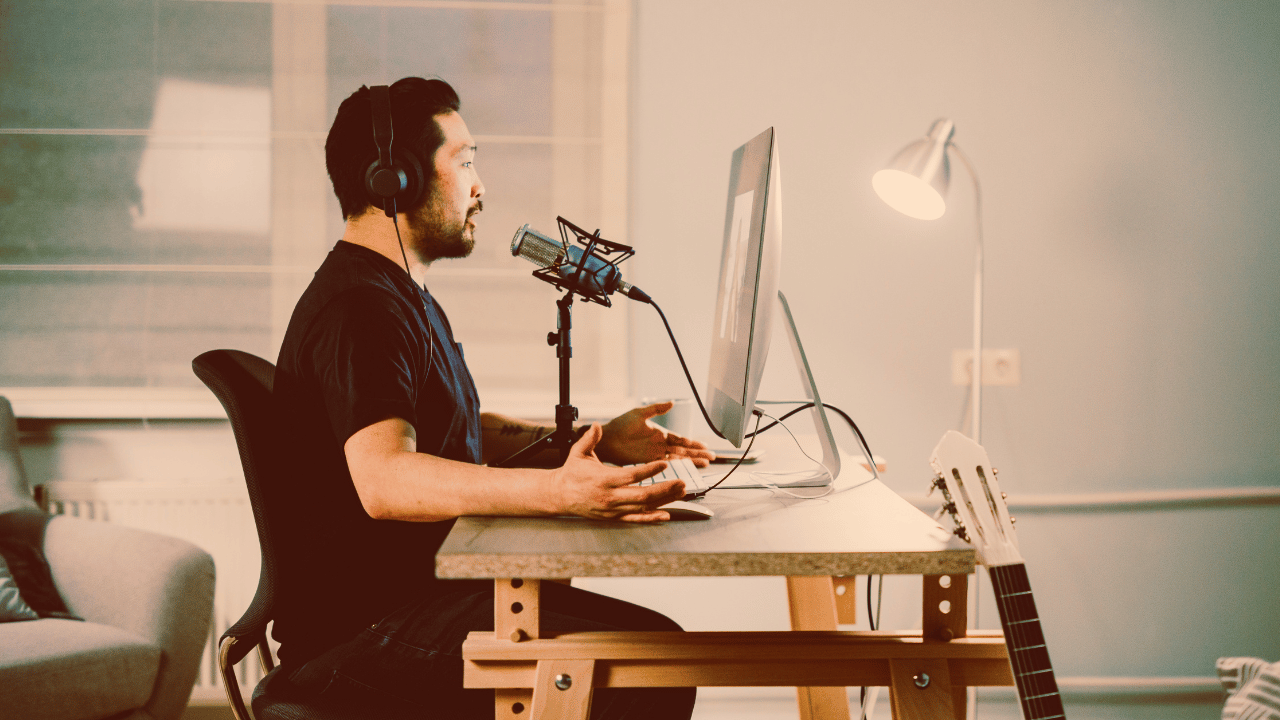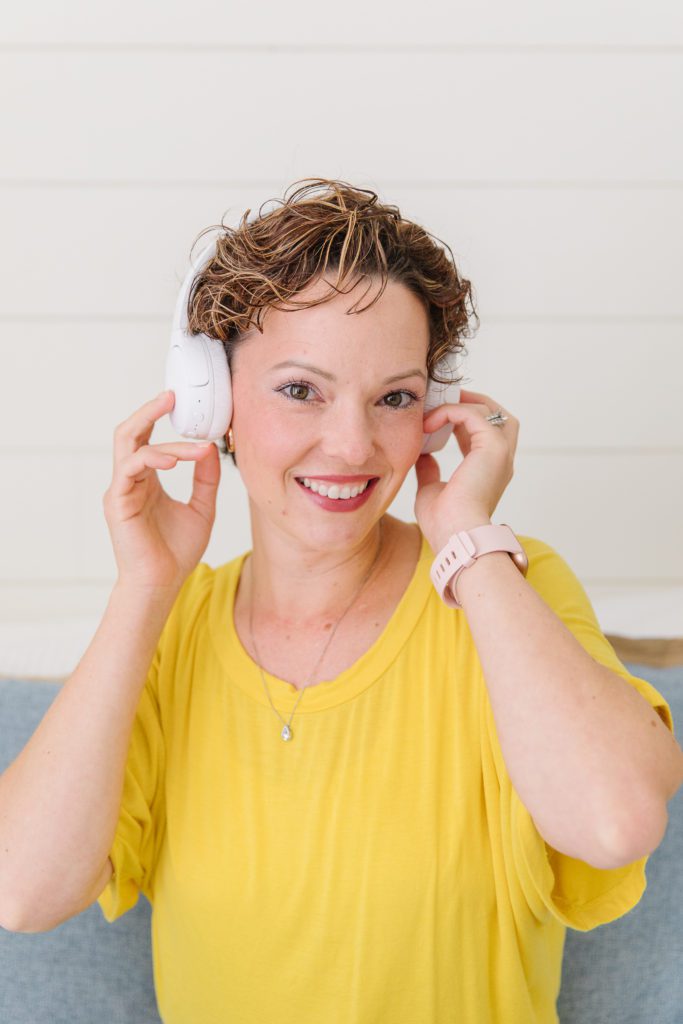Three Ways to Get Great Audio Quality From an Online Remote Recording Environment
Today’s remote recording opportunities make podcasting the ideal medium for entrepreneurs and small businesses to effectively and efficiently reach their target audience, regardless of their unique location or living situation.
All you need is an internet connection, video conferencing software, and time for a recording session, and you’re set, right?
Well, yes, but there’s a little more to it.

Listeners expect high-quality audio, and if you aren’t focused on providing crisp, clear sound in addition to creating content that connects with your audience, you risk losing listeners and experiencing low download rates. When you take the time and care to ensure your podcast’s sound quality, you reflect your professionalism to your listeners.
We have all listened to remote interviews full of background noise, lip smacks, plosives, and other tell-tale signs of bad audio. You may have even listened to the entire interview if the content was valuable, but after suffering through the poor audio, it’s likely you have a headache, feel irritable, or need to give your ears a rest. That’s not how you want people to feel after listening to one of your interviews!
Plus, if you’re interested in monetizing your show through sponsorships or other traditional methods, ad partners will expect high-quality audio and video they’re proud to share.
Rough, potentially un-edited podcast audio tends to turn listeners away, even if they don’t consider themselves audio snobs! Whether you’re recording audio locally or figuring out how to record remote interviews, your attention to detail in the sound quality department will help you gain new listeners and further ensure they stick around.
So, how do you achieve studio-quality results without an audio team backing your every move now that you’re ready to start recording remote podcasts?
Let’s look at several ways you to improve your remote interviews and record high-quality audio.

How to get High-Quality Sound in a Remote Podcast Interview
First, let’s highlight one fact: you can’t control every factor in a podcast interview.
To a certain extent, you’re relying on your guest to have a strong internet connection, a good quality external mic, and the willingness to read and follow any instructions you have sent about the remote recording.
You do, however, have control over the following:
- whether each attendee is recorded on separate tracks,
- your selection of recording software,
- whether you’ll allow your audio to be played through the guest’s computer speakers,
- all pre-recording communication, and
- your attitude toward the process.
1. Require a Strong, Hard-wired Internet Connection
No matter which USB mic you have or the remote recording platform you use, your remote interviews will sound poor if the internet connection is weak or inconsistent. You can’t control your podcast guests’ connectivity, but you can offer a few suggestions and spend the time needed to troubleshoot with less tech-savvy guests.
No matter what, long-distance interviews are significantly less likely to result in high-quality sound when either party relies on wifi. You should be willing to reschedule a remote recording if the internet connection isn’t up to par or if they need to move to a hard-wired connection.
Try to avoid scheduling your guest to record remotely during peak internet usage times. In most cases, you can check with your internet provider to find their highest traffic hours and avoid a poor or slower connection by scheduling your interviews outside that window.
If, potentially based on location, your guest has a poor connection no matter the time of day, then you could plan to use the voice recording app on their cell phone to record a remote interview, if absolutely necessary. This should be the last case scenario and rarely happen, if ever.
However you decide to proceed, be aware that a good internet connection is a major key to producing studio-quality sound from a remote interview or co-host situation, even if you use the best recording software.
2. Good Communication Leads to Good Sound Quality
Great podcast episodes start with great communication; therefore, you will have to take care of several aspects before the interview recording appointment.
Prior to the remote recording time, hold an open discussion (over the phone, video, or via email) with your guest. Address concerns and clarify:
- The topic of your show
- The platform for the video call
- The timing of when you and your guest will speak
- How the audio will be recorded (audio only or video and audio together or audio and video separately)
- Any technical aspects of the episode that are unique to your show
- Do they have a digital audio workstation, or can they barely turn on Zoom?
- Are your guests comfortable with technology or terrified of it?
One way to ensure your guests pay attention to the show’s technical requirements is to start a simple conversation rather than send them a giant email with a lot of text they will likely ignore.
Begin by asking them what microphone they have and whether it has a pop filter. This will open up the conversation about the required equipment and provide you insight into how well the guest is prepared. Build a conversation naturally through short emails that will keep the guests from feeling overwhelmed.
Although automation and a single email may feel like you’re saving time, an ongoing conversation may help create communication that will lead to a better remote recording experience for you and your guest, plus higher quality audio which your listeners will appreciate.
3. Expect Your Guest to Have A High-Quality Microphone
To get the best audio quality possible, you need to ensure your guests have a decent microphone and that they know how to use it. You can find out what type of equipment they have and how experienced they are with it through strong pre-interview communication.
Do more than tell guests what you want by providing advice about mic technique (how close to speak, which part of the microphone they should speak into, and whether the mic should be straight in front of their mouth or off to the side) per the manufacturer’s recommendations. If they need a reliable USB microphone, you can provide a short list of affordable, easy-to-use equipment for remote recordings.
Find out where they will be recording and emphasize the importance of their effort toward background noise reduction. Ideally, your guests will be recording in a quiet space without a ton of hard surfaces or high ceilings. Depending on the nature of your show and your guest list, this may be one of the variables outside of your control. Make your suggestions and do your best to work toward an amicable solution.
If you are serious about doing your remote podcast recordings and have enough lead time, consider sending your guests a microphone kit for the interview. You can arrange a deposit system and require that after guests record, they return it.
If you don’t have time to get a microphone sent out, you can still help your guests create an excellent audio recording by encouraging them to have wired headphones to use during the video call. A simple solution is a pair of earbuds with a built-in mic – like the ones that come with iPhones. Whatever you do, say NO to recording with Bluetooth equipment like Airpods.
If you plan on recording audio and video content, you’ll want to encourage a lapel or a standing mic, so the guests are free to move and gesture to bring authenticity to the recording. However, if you are using a separate audio file, listeners won’t see the guests, so simple mics will work.
Most video conferencing software has echo cancellation and other “magic” features built in, so, as a last resort, the guests can use the computer mic. This won’t capture high-quality audio, but there’s a small chance the track can be improved through the use of editing software.
Creating the Right Environment for a Successful Remote Interview
Although attitude doesn’t sound like a variable in a tech situation, your positive attitude will help keep your guests calm and excited about the interview, which is more likely to help you get the content you want with the highest quality sound possible.
Establishing clear, consistent communication before the interview will help outline your expectations, provide an opportunity to foster a connection beyond the interview, and allow you to set your guests up for success and ultimately capture great audio and video.
Podcasting and online recording software have helped us break through the physical and local limitations of who could be interviewed on any given show. Now, when you decide to podcast remotely, you are opening your show and your audience to unlimited resources worldwide through the power of remote interviews.
Podcasting is a long-term endeavor, and much like starting a business or raising a family, your work is never done. There’s always an area in which to learn more, expand, and improve.
As you increase your audio quality, hone your interview skills, and discover what you and your audience enjoy most, don’t be surprised to see your download numbers rise.
Next time you hit record, you’ll move through your remote podcast interviews with more confidence, knowing you have all the power to make your guests’ audio sound amazing.
If you need help directing your guests, establishing procedures, reviewing your software settings, or editing your remote interviews, book a free call with me today! I’m here to help you produce a show you’re proud to share.

Written by Virginia Elder
More From This Category

How to Name Your Podcast: Identify the Gap in Your Industry | Bri Conn | Ep 54
What if you niched down so far that you only served a very specific, small sub-set of the population? That’s exactly what Jay Zigmont and Bri Conn did when they established the Childfree Wealth® podcast and brand. Both of them saw a gap in the traditional CFP...

How To SEO Your Show: Making It Easy for Ideal Clients to Find Your Podcast | Ep 52
Learn the exact SEO strategies we use to help our podcast clients get found. You’ll find out how to tweak the written content around your podcast to make any algorithm display your content to your potential clients. Listen for tips to create the best titles, include...

Podcasting: A Powerful Post-Conference Follow-Up Tool
SUMMARY: Podcasting is a great way to follow up with people you meet at conferences. By creating podcast episodes about conference topics and sharing them with your new contacts, you can stay connected, build trust, and turn those connections into clients. Watch the...
0 Comments
Affiliate Disclosure: Happy Healthy Abundance, LLC dba Podcast Abundance is a participant in affiliate link programs and may accept payment from sponsors as a way to provide you with products, courses, and programs that I love, and may include items from Amazon and any other programs or products I believe will provide benefit you. Affiliate links are located throughout this website. The links provide a small percentage of commission to Happy Healthy Abundance at no additional cost to you. Affiliates and Sponsors have been carefully selected with integrity and I’ll never promote anything or accept sponsorship for a product or course or from a company that I don’t believe will actually improve your life and help you in your journey toward abundance.

0 Comments